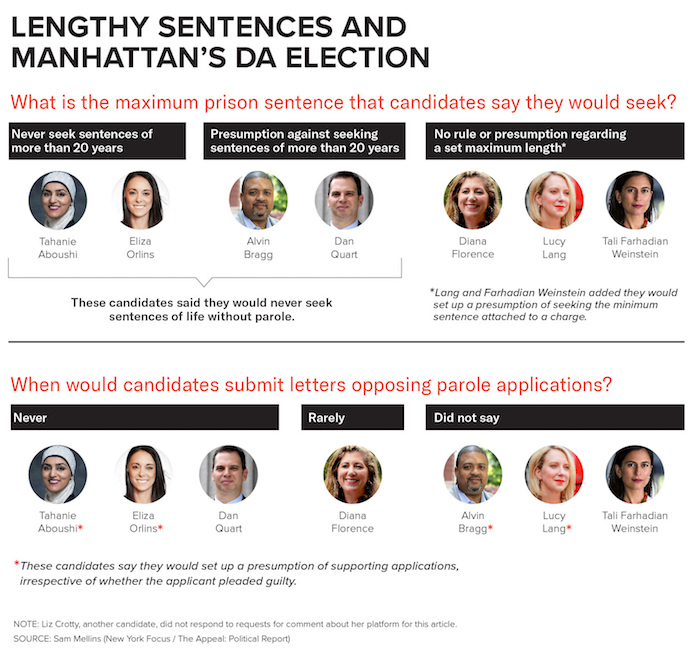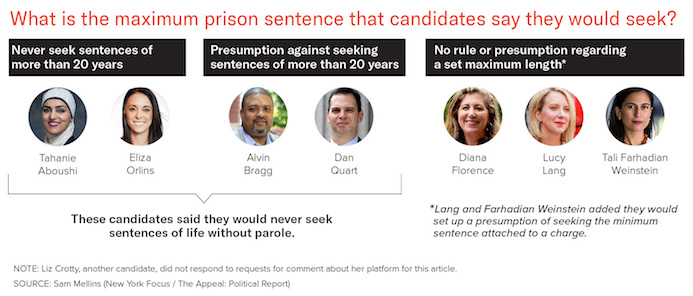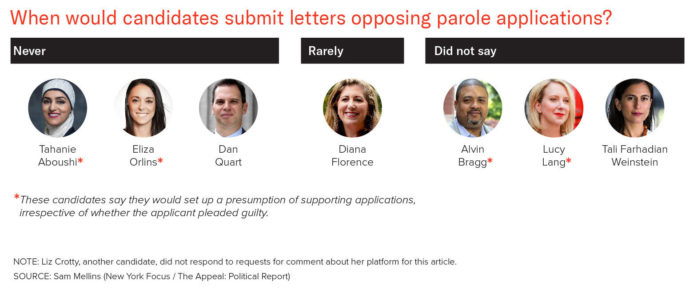Thousands of New Yorkers are in Prison for Life. These D.A. Candidates Want to Change That
Manhattan D.A. candidates vow to reduce lengthy sentences—but sharp differences between their approaches remain

This article is published as part of a partnership between New York Focus and The Appeal: Political Report to cover Manhattan’s 2021 DA election. Read our first articles, on the war on drugs, statewide advocacy, and sex work.
Jose Saldana spent 38 years in New York’s prison system after a Manhattan court found him guilty in 1980 of attempted murder of a police officer. He was denied parole four times. Each time he was denied, and again at the parole board hearing that led to his release in 2018, Manhattan District Attorney Cy Vance submitted a letter asking that he not be granted parole.
Parole commissioners mentioned the letters at all five hearings, Saldana recounted. None of the letters spoke to the person he was after decades in prison, he said; none mentioned the remorse he felt about his crime, the associate’s degree he’d earned, or the many younger incarcerated people he had mentored.
“He would oppose my release just on general principle, not knowing a damn thing about me, 30 years later,” Saldana said of Vance, adding that his experience is common among people convicted by the Manhattan DA.

Saldana is now the director of the Release Aging People in Prison (RAPP) campaign, which advocates for New York to expand early release for people who face the risk of dying in prison. This is a strikingly common fate in the state: Approximately 8,000 people are serving life sentences in New York today—nearly a fifth of the state’s prison population. Eighty percent of them are Black or Latin.
The DA election in Manhattan looms large in advocates' efforts to change the state's culture around incarceration. Vance is not seeking re-election, and eight candidates are running in the Democratic primary on June 22 to replace him.
Many of these candidates told New York Focus and The Appeal: Political Report that they would roll out new policies to reduce life sentences or very lengthy sentences.
They are making the case that people change and deserve second chances. Data shows that older people are far less likely to commit crimes. Lengthy prison sentences cost immense amounts of money, and there is little evidence that they significantly deter crime.
Several candidates said they would never oppose someone's parole application, echoing a new policy rolled out this year by New Orleans’s progressive DA, and most said they would support many more applications than at present. Some candidates said they would restrict if not prohibit their staff from seeking new sentences that exceed 20 years, let alone life sentences.
Such reforms would represent a major break from prevailing practices in the Manhattan DA's office, public defenders and legal advocates said.
“For years, the Manhattan DA has been up-charging, pushing for long and life sentences, and opposing mitigation and alternatives on the front end and parole on the back end,” said Katie Schaffer, director of organizing and advocacy at the Center for Community Alternatives.
“A new DA committed to shrinking the size, scope, and harm of the office could limit the number of New Yorkers whose lives and families are torn apart by carceral responses.”
Death by incarceration
Seven of the eight candidates running for DA—all but former prosecutor Liz Crotty—spoke to New York Focus and the Political Report for this story. (Crotty did not respond to requests for comment.) All seven vow to take some measures to impose fewer life sentences, but there are sharp differences in the scope of their approaches.
For advocates who want to bring down the nation's sky-high incarceration rate, there is no way around targeting the ease with which the criminal legal system imposes life sentences or decades-long sentences that may also condemn a person to die in prison. New York imprisons more people for life, as a proportion of its population, than countries like Germany or Japan imprison people at all.
“We won’t eliminate or even make a serious dent in mass incarceration without dealing with these deep-end sentences,” said Ashley Nellis, a senior research analyst at the Sentencing Project and co-author of a book on life imprisonment.
Because sentence lengths tend to be determined in relation to each other—with shorter sentences set on robbery than on homicide, for example—reducing the lengthiest sentences is the most effective way to reduce incarceration rates as a whole, Nellis explained.
Lawmakers in Congress and in various state legislatures have proposed reforms to reduce life imprisonment, including for violent crimes. But until such changes come to New York's court system, its DAs will continue playing an outsize role in whether the status quo changes.
Sentences in New York are officially set by judges. But they generally correspond to the charges that defendants face, and prosecutors have extremely wide discretion in deciding what charges to bring, if any, against arrestees, as well as what sentences to recommend to judges.
Attorneys who practice in New York told New York Focus and the Political Report that Vance's office has not used its power to turn the tide against life sentences.
“There is no policy or practice in place [under Vance] to avoid maximum sentences, to avoid sentences that go over 20 years, to avoid life sentences,” said Elizabeth Fischer, a public defender with Neighborhood Defender Service, an organization based in Harlem.
“The current DAs office uses their discretionary power to charge the highest possible charge on which they think they can get an indictment,” Fischer continued. “In cases where a life sentence is authorized, more often that not, the life sentence is the offer or recommendation from the DA’s office.”
Vance’s office did not respond to multiple requests for comment.
But these sentencing practices could shift significantly next year, when a new DA will take office.
Asked about their approach to lengthy sentences, many candidates challenged the imposition of prison sentences of more than 20 years. Last year, voters in places like Los Angeles and Austin, Texas, elected prosecutors who ran on curbing sentences that exceed that length. Now some Manhattan candidates are drawing even starker lines in the sand.

Two candidates—civil rights attorney Tahanie Aboushi and public defender Eliza Orlins—went the furthest, committing to never seek sentences of more than 20 years.
Assemblymember Dan Quart said he would set up a “rebuttable presumption” of not seeking a sentence longer than 20 years, adding he would be “unlikely” to overturn it; he has told the Political Report he would consider doing so in “extreme cases, such as mass shootings and domestic terrorism.” A spokesperson for Alvin Bragg, a former chief deputy attorney general for New York, said he would make 20 years a “default maximum sentence,” though the campaign did not specify under what circumstances he would veer from that default.
Aboushi, Bragg, Orlins, and Quart also say they would never seek sentences of life without the possibility of parole.
“Life without parole is a death sentence, and it’s capital punishment by different means,” Quart said. Aboushi mirrored this position: “Like the death penalty, life without parole labels a person as nothing more than the worst thing that person ever did and ignores the reality that everyone is capable of growth, change, and rehabilitation.”
The remaining candidates, former prosecutors Lucy Lang, Diana Florence, and Tali Farhadian Weinstein, made no mention of a 20-year threshold. Still, each said they would rarely seek the maximum sentence allowed by law. Farhadian Weinstein and Lang also said their default policy would be to seek the minimum sentence that falls within sentencing guidelines, though they did not specify in what cases they might seek longer or maximum sentences. In addition, these three candidates did not rule out seeking life without parole sentences.
Commitments to generally seek minimum sentences are less bold than they sound, Fischer warned, because mandatory minimum statutes can trigger lengthy sentences under some circumstances, depending on the charges a prosecutor has filed.
For instance, “felony enhancement” statutes mandate long periods of incarceration for second and subsequent felony offenses. Prosecutors could sidestep these by filing misdemeanor rather than felony charges when prosecuting individuals with prior felony convictions—by charging possession of half a gram of cocaine, for example, as a misdemeanor rather than as a felony potentially carrying a sentence up to life imprisonment sentence for third or subsequent felony offenses.
Six candidates—Aboushi, Bragg, Florence, Lang, Orlins, and Quart—said they would make efforts to avoid felony enhancements by charging misdemeanors instead.
Farhadian Weinstein, though, expressed skepticism toward prosecutors lowering charges to make a sentence less harsh. “I believe in truth in charging—we must bring the charges that fit the facts,” she said.
Rigodis Appling, an attorney with the Legal Aid Society, said prosecutors’ charging decisions testify to their values when it comes to incarceration. Typically, she said, Manhattan prosecutors respond to the facts of a case by “taking a perspective that is the harshest you could take when looking at those facts.”
Another choice that Manhattan prosecutors sometimes make is opposing the “youthful offender” status for children whom they are prosecuting as adults. The designation is a legal framework available for minors that limits the possible felony sentence length to four years and automatically seals the child’s record. Without it, the child would face a lengthy sentence.
“Supporting youthful offender status in every case would have a tremendous effect on young people’s ability to overcome criminal legal system involvement and lead successful, productive lives,” Fischer said.
Bragg, Quart, Aboushi, Orlins, and Lang said they would always support granting “youthful offender” status to minors. Farhadian Weinstein and Florence said they would generally or presumptively support this status, though they left the door open to opposing it.
Beyond the courtroom
To make a dent in the large prison population serving life sentences in New York, advocates say, any new strategy would need to include releases of people who are already in prison. Here, too, a DA can stand in the way or facilitate the process.
The letters to parole boards that DAs often write to support or oppose parole applications can be very influential.
Legal practitioners say Vance has been reluctant to write letters of support. Saldana added that Vance’s office “routinely” contacted parole boards to oppose applications like his own.
Saldana thinks it would make a difference if the next DA was more supportive of applications, or at least was willing to get out of the way. “The parole commissioners are of like minds, and anything they can hang their hat on to deny someone [release], they will,” he said, explaining why a single letter by a DA’s office that prosecuted the case decades earlier can have such weight.

Aboushi, Orlins, and Quart told New York Focus and the Political Report that they would never step in to outright oppose a parole application, even when they do not support it.
“I have seen firsthand how the current Manhattan DA’s office’s policy of writing letters that strongly oppose the early release of a person who is incarcerated has been devastating to families and communities across our city,” Orlins said.
Florence said she would oppose applications from people convicted in some extreme cases. Farhadian Weinstein mentioned a policy she worked on while general counsel in the Brooklyn DA’s office that required prosecutors to obtain supervisory approval to oppose an application, but she did not answer a follow-up question on whether she would ever oppose applications as DA. Bragg and Lang did not address whether they would ever oppose parole applications.
Asked how they would change current practices on when to actively support an application, four candidates—Aboushi, Bragg, Lang, and Orlins—said they would make it a “default position” or a “presumption” to support applications. They mostly did not specify the circumstances that would limit that presumption, though Aboushi mentioned “evidence of recent, violent conduct in prison,” and Lang mentioned the highest-level offenses such as serial murders.
Farhadian Weinstein said she would establish a default of supporting parole applications in cases where incarcerated people had pleaded guilty, noting that she helped institute such a policy in the Brooklyn DA’s office. In 2019, Brooklyn DA Eric Gonzalez announced a default policy of supporting applications for people who pleaded guilty and then maintained a clean disciplinary record in prison, saying his office used to “ordinarily oppose” applications and that his new policy would “reflect the bargain we made with” people who pleaded guilty.
But Appling, of the Legal Aid Society, worries that making it more likely that someone can achieve parole if they plead guilty amounts to a “trial tax,” referring to the common practice of seeking harsher terms against individuals who take their case to trial instead. “The only reason I can think of is to coerce [guilty] pleas,” she said, explaining that it may add to the pressure to forgo a trial.
Florence and Quart laid out no rule or presumption on when they would step in to support parole applications.
If the next DA were to make a serious effort to reduce sentences, avoid enhancements, and support parole applications, the effect would be transformative.
And it could reverberate far beyond Manhattan. Reform advocates are pushing New York lawmakers to increase opportunities for parole for incarcerated people over 55, a reform known as “elder parole,” and pass other bills that would increase parole eligibility for all incarcerated people.
Theresa Grady, an activist with the RAPP campaign, hopes that the next Manhattan DA will join those efforts.
“I’ve seen people go into jail at 25 years old, and when you see them in another year or three years, they’re looking like 55 already,” she said. “Hopefully, with a new progressive DA, it will be that they look at them in another light, and see that it doesn’t have to be long sentences.”
Note: The text and the accompanying graphic have been updated with additional information about candidates’ positions on the maximum sentences they would pursue.




